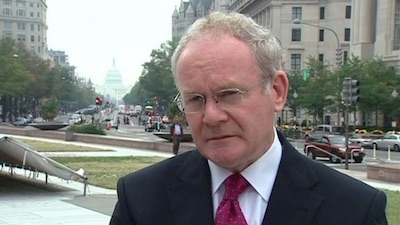
Sinn Fein’s Martin McGuinness has travelled to Washington DC this week to ask for US assistance to prevent British welfare cuts being implemented in the north of Ireland.
The US administration has received contrasting assessments of the political crisis that threatens the power-sharing institutions set up under the 1998 Good Friday Agreement, as the British government’s Direct Ruler in Ireland also travelled to Washington for talks.
Theresa Villiers announced her visit shortly after Martin McGuinness announced his, but insisted her visit had been scheduled for months.
Power-sharing between nationalists and unionists in Belfast remains in danger of collapse due to a bitter row over the implementation of welfare cuts which were agreed as part of the Stormont House Agreement, agreed in December.
Without an agreement, the British government could move to withdraw welfare powers from Stormont, returning such decisions to Villiers and her officials.
The welfare stalemate has put a number of other outstanding issues from the Good Friday Agreement on the backburner, such as truth and justice over state killings, the right to live free form sectarian harassment, recognition of the Irish language, and Sinn Fein’s call for a Six County ‘border poll’.
The perennially deadlocked Stormont administration has recently been hit by a wave of scandals over corruption and malfeasance by politicians and officials. A seven million pound sum uncovered in an offshore account has been linked to a shady deal with a US vulture fund, while millions of pounds of public funds which have been frittered away on local ‘pork barrel’ projects or siphoned off by loyalist crime gangs.
“The British government will not finance a more generous welfare system in Northern Ireland than in the rest of the UK”, Villiers declared, before her departure.
“The US remains the UK’s closest ally... The Stormont House Agreement remains the best hope for building a brighter, more secure future for Northern Ireland. But for that to happen, the agreement needs to be implemented in full. I will be looking for continued US support for that,” she said.
Mr McGuinness met the Friends of Ireland caucus on Capitol Hill, the State Department and other senior administration officials. After meeting with State Department officials at the White House, he described the encounter as “positive and encouraging”.
“The US administration clearly remains engaged with the political process in the north and they continue to play a constructive role,” he said.
“At the meeting I made it clear to them that the institutions of the Good Friday Agreement, which have underpinned the peace process for almost two decades, are facing a real crisis as a result of the policies of this British government.
“The political institutions, and the progress we have made over the last two decades of the peace process, are under a real threat and it is my hope that the US administration can encourage the British government to take a more positive approach on dealing with the North.”
It is feared that without a breakthrough the devolved institutions could collapse. In late June a “pretend” budget was passed, with the goal of sustaining the institutions into the autumn, in the hope that before the crisis point was reached the impasse over welfare reform could be resolved.
Unionists have accused McGuinness of “looking over his shoulder at the Irish Republic election” and said he should make “tough decisions” on welfare cuts.
DUP finance minister Arlene Foster said Martin McGuinness’s trip was a “waste of time” because “Westminster of course is in charge of our budget”.
‘UNDEFEATED’ IRA
This week has also seen the subdued anniversary of a Provisional IRA statement which formally ended its campaign, ten years ago.
Speaking ahead of the anniversary, the British Prime Minister David Cameron raised heckles when he spoke about how ‘British resolve saw off the IRA’.
In response, Sinn Fein leader Gerry Adam said the claim that the Provisional IRA had been defeated was a ‘distortion’.
“More than 20 years ago, in one of the defining developments of modern Irish history, the IRA announced a total cessation of military activities,” he said.
“The subsequent success of the peace process and the transformation of politics across this island and between Ireland and Britain were the result of the efforts, commitment, political courage, determination and personal engagement by the key players.”
Mr Adams, who met Cameron in mid-July as part of a Sinn Fein delegation, said the British PM had shown a “worrying ignorance” of the political process in the Six Counties.
“The reality is that the IRA was never defeated and that again and again it was Irish republicans, including the IRA leadership, which took bold steps to bolster the peace process and to maintain positive political momentum.
“Ten years ago this week, on 28 July, 2005, the IRA formally ended its armed campaign and gave its support to purely peaceful and democratic means of achieving republican objectives.
“David Cameron would do well to understand that it was such initiatives which broke the long cycle of conflict and opened up new political possibilities.
“However, the progress that was made over many years is now in severe jeopardy, not least because of the attitude of Mr Cameron.”
![[Irish Republican News]](https://republican-news.org/graphics/title_gifs/rn.gif)
![[Irish Republican News]](https://republican-news.org/graphics/title_gifs/harp.gif)

